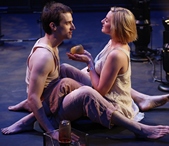SITE GUIDE
REVIEWS
REVIEW ARCHIVES
ADVERTISING AT CURTAINUP
FEATURES
NEWS
Etcetera and
Short Term Listings
LISTINGS
Broadway
Off-Broadway
NYC Restaurants
BOOKS and CDs
OTHER PLACES
Berkshires
London
California
New Jersey
DC
Philadelphia
Elsewhere
QUOTES
TKTS
PLAYWRIGHTS' ALBUMS
LETTERS TO EDITOR
FILM
LINKS
MISCELLANEOUS
Free Updates
Masthead
A CurtainUp Review
Anthem
By Joyce Friedland
|
"It is a sin to think words no others think and to put them down upon a paper no others are to see. It is base and evil. It is as if we were speaking alone to no ears but our own. And we know well that there is no greater transgression blacker than to do or think alone. We have broken the laws."— Equality.
|

MATTHEW Lieff Christian and Sophia Lauwers
(Photo: Carol Rosegg) |
Readers and now playgoers are either staunch supporters or avid nay-sayers to Rand's glorified individualism: no middle-of-the roaders here. Audience members seemed to have come to the play seeking a confirmation of their polarized views.
Ayn Rand wrote Anthem in 1937, prior to the novels for which she became most famous &mdash Fountainhead and Atlas Shrugged. Although this work is shorter and less complex than her later works, it lays out her philosophy as an easily understood parable. Over the years, it has become a "beginners" Ayn Rand, and a point of reference for today's libertarians.
To be fair to Anthem, the play, I've attempted to wipe the slate clean of the book's political innuendo and assess the work as a play on its own merits and shortcomings. Jeff Britting, who is the curator of the Ayn Rand Archives in Irvine, California, adapted the novel for the stage, composed the background music, and produced the filmed images that are projected on a large screen at the back of the stage. The music and the filmed images are striking and serve to heighten the drama. In fact, they could stand alone as an art installation. Developed as background, they sometimes take center stage.
The plot takes us to a dystopian future world where the word "I" is a criminal offense. At first, the central character, Equality 7-2521, played effectively by Matthew Lieff Christian, is shown risking his life by being alone in a tunnel he has discovered, using a candle to write and then proclaim his own thoughts. He suspects that there was once a world where individual thought and action were permitted, unlike his present one where all actions have to be corroborative and accessible to the masses.
In this world where all thoughts have been "dumbed-down" and all actions are controlled by government decree, Equality falls in love with Liberty 5-3000, played by the beautiful and spirited Sofia Lauwers. They proclaim their union in defiance of the law, which propels them to act upon their own needs and desires, will ultimately benefit all of society.
Britting has remained true to the tone, cadence and language of the book, with the characters speaking in voices that sound almost biblical. In preserving so much of the language of the book, Britting has risked creating a play that may be too "talky" for contemporary audiences.
There is little action in this relatively simple parable that asks the playgoer to compare the depressing world in which Equality finds himself to a future world in which individualism will return. Rand's warning that individual accomplishment and human happiness will cease if the world continues to spiral toward communal action and total equality is repeatedly evoked in this adaptation. The fine acting, the musical background, and the filmed imagery on the screen help to offset the repetition and sometimes heavy-handedness of the message.
I doubt whether this play is going to change anyone's mind about the value of Ayn Rand's philosophy. Both sides will probably dig deeper into their own opinions. But Anthem can promote conversation that will illuminate contemporary politics and different paths leading to human happiness.
|
Anthem adapted by Jeff Britting from Ayn Rand's Novel Directed by Ann Ciccolella Cast: Matthew Lieff Christian (Equality 7-2521), Tina Johnson (Democracy 2-5799), Lelund Durond (International 4-8818), Sofia Lauwers (Liberty 5-3000) Scenic Design: Kevin Judge Costume Design: Theresa Squire Lighting Design: Jason Amato Composer: Jeff Britting Stage Manager: Libby Unsworth Running Time: 90 minutes, no intermission From 9/25/13; opening 10/07/13; closing 12/01/13 Reviewed by Joyce Friedland at October 4th press preview |
|
REVIEW FEEDBACK Highlight one of the responses below and click "copy" or"CTRL+C"
Paste the highlighted text into the subject line (CTRL+ V): Feel free to add detailed comments in the body of the email. . .also the names and emails of any friends to whom you'd like us to forward a copy of this review. For a feed to reviews and features as they are posted add http://curtainupnewlinks.blogspot.com to your reader Curtainup at Facebook . . . Curtainup at Twitter Subscribe to our FREE email updates: E-mail: esommer@curtainup.comesommer@curtainup.com put SUBSCRIBE CURTAINUP EMAIL UPDATE in the subject line and your full name and email address in the body of the message. If you can spare a minute, tell us how you came to CurtainUp and from what part of the country. |

|


 Book of Mormon -CD
Book of Mormon -CD